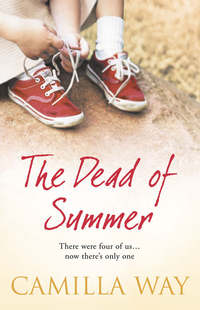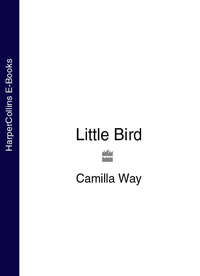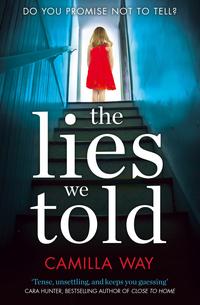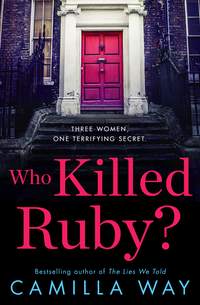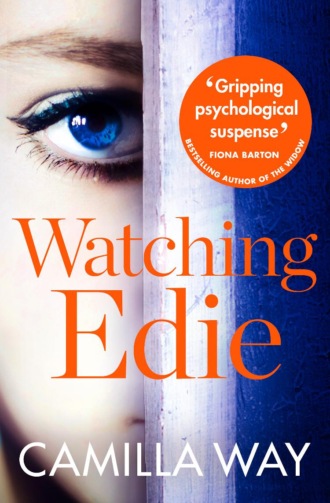
Полная версия
Watching Edie: The most unsettling psychological thriller you’ll read this year
So when they told me one evening after supper that Dad had been offered a new job in an English town 160 miles away, that it meant a promotion and a bigger house, I knew the real reason for the move: we would be going somewhere nobody knew about us, about what had happened, and what it meant. And a month later here we were. But nothing changed, not really. My mum found a new church to go to, but apart from that she still hardly ever leaves the house. These days her focus is on me. My schoolwork, my weight, my piano practice, my future. She’s trying to make me better, I think.
Now that the exams are over I have seven empty weeks to fill, so when I’m not helping Mum around the house or doing my volunteering work there’s nothing much else to do but walk. Fremton’s right next to the motorway, so wherever you are you can hear it, the never-ending rush of traffic on its way to somewhere else. The whole town feels like it’s been forgotten somehow, like everyone upped sticks and left years ago. There’s a canal that runs through the middle but no one goes down there very much and the shops in the square are mostly empty since the superstore opened on the Wrexham road. There’s a big statue of a miner in the centre of the square, carrying a sack of coals on his back, but someone’s spray-painted a big orange willy on his head. Then there’s just streets and streets of council houses till you get to the Pembroke Estate, three high towers pushed right up against the motorway, like they’re standing guard, warning outsiders away.
Wherever I go I look out for Edie, my eyes scanning the faces I pass, hoping that one day one of them will be hers. I think about her smile and her brown eyes and how nice she’d been to me and I wonder what she’s doing and where she lives, whether she’s bored or by herself like me. Then, out of the blue, I see her again. I’m walking home through the square when I spy her sitting on a bench by the statue, smoking a cigarette. I stop in a shop doorway to watch her. She’s wearing a short denim skirt and her legs are long and tanned, stretched out in front of her, a silver chain around one ankle. Her hair hangs loose around her shoulders and she smokes her cigarette like she’s deep in thought. She looks beautiful. It’s as if she shines against the greyness of this town, I think, like she’s full of light. I hesitate before half raising my hand to wave and I’m about to call her name when someone cuts across in front of me and reaches her first. My hand falls to my side, her name catching in my throat.
I can’t see him properly, whoever he is, this person who’s come between the two of us. I only know that his effect on her is instant, her face and neck flushing pink, her eyes wide and bright. She listens to what he says, laughs and glances away, but only for a second, as though her eyes can’t quite help being drawn back to him. And then he sits down next to her, so close that their arms touch. He says something and she shakes her head, a smile hovering upon her lips, and I don’t know what it is, this strange heat that’s there in the crackling, held-breath space between them, I only know that it has no place for me.
As quickly as it began, it’s over. He leans in close and murmurs one last thing in her ear that makes two red spots appear high on her cheeks before he gets up and walks away. I get a clearer look at him now. He’s dressed in tracksuit bottoms, a zipped-up jacket with a hood. He’s about twenty or so and very handsome, I suppose, though I don’t like his face at all, its roughness and its smile that shows he knows she’s watching him still. I wait for a few moments more, in the shadow of the shop’s doorway, before I take a breath and go to her.
When I’m there, standing in front of her, saying her name, she looks at me so strangely, as though she hardly knows where she is, tearing her eyes from his retreating back and blinking up at me. ‘Edie?’ I say again, and the moment lengthens until, at last, her expression clears and she smiles and says, ‘Oh, hiya! Heather, right?’ and my heart somersaults with relief.
After
A new family’s moving into one of the ground-floor flats today. I stand by the window and watch them; a couple of teenage lads lugging furniture from a van, while a small, ginger, tattooed woman shouts directions from the kerb. As I watch, she raises her arm to point at something and her top rides up to reveal a long, red scar running the entire width of her back and I find myself wondering how she got it, what could possibly have happened to leave such an awful wound behind. Best part of an hour it takes them, the two, grim-faced boys towering over their mother as they traipse back and forth beneath boxes, a sofa, a fridge, watched all the while from the van’s front seat by a shining black lump of muscle and teeth that barks and barks and barks.
My hands fall to the warm curve of my belly. The decision to keep it, the baby, was never consciously made, I just never went through with getting rid of it. I got as far as making the appointment, booking myself in at a clinic, but when the time came for me to put on my coat and take myself to the bus stop, I simply didn’t. My coat stayed where it was, I stayed where I was, and the seconds and minutes ticked by until the time had passed, my appointment had been and gone, and the phone with which I could call and reschedule remained untouched. I had never actively wanted a child – motherhood was something that happened to other women, not to me – yet some stubborn, unexamined part of me clung to the life growing in my belly, and it clung stubbornly to me.
The boys carry the last of the boxes from the van and are followed into the building by the woman and the dog. Within minutes I hear the sound of banging coming from the ground floor, the repeated thwack of a hammer echoing up the stairwell, and I stay where I am for a while longer, staring out at the street, watching the afternoon traffic pass until the hammering stops and the sound of a drill takes its place.
Heri, my baby’s father, was a chef at the restaurant where I waitress. Like me he worked more and longer shifts than everyone else and we were often left to lock up together, sometimes sharing a beer after a long night. He would tell me about his home in Tunisia, about lagoons and deserts and the sirocco winds. I liked him; I liked that he didn’t push his nose into my life, never asked questions I didn’t want to answer, liked that he was always somehow self-contained and by himself, like me.
The night we spent together was not unexpected, but never repeated. An attraction that had always been there flickering into life one evening and, for no particular reason, acted upon. From the window of his bedsit you could see the floodlit grounds of Charlton Athletic Football Club. ‘You see!’ he said proudly as we stood looking out. ‘The very best seats for free!’ He’d shaken his head sadly as he added, ‘You English really can’t play football.’ We drank beer and talked about our corner of south-east London. The only possessions he seemed to own were lined up on the windowsill: a book, a metal tin, some writing paper and pens, a photograph of a woman with a small boy. His clothes were folded neatly on a chair, his bed a single mattress pushed up against the wall.
‘You are a strange one,’ he said, turning to me, his large, almost black eyes watching me in the half-light. ‘So beautiful, work so hard, so quiet.’
I continued to stare out at the illuminated pitch.
‘You never talk about yourself,’ he went on. ‘Why are you not married, not …’ He shrugged, and when still I didn’t reply, he reached over and brushed a strand of hair from my face.
We undressed in the yellow glow of the floodlights, his skin dark and warm against my paleness; a night’s comfort. And afterwards our friendship had continued exactly as it had before. When the day came for his wife and little boy to join him over here, I was happy for him and wished him well. He left the restaurant soon after for an office-cleaning job the three could do together and even after I learnt I was pregnant the thought of contacting him never occurred to me.
And the child inside me grows. I don’t think about what will happen after it’s born; a strange calmness possesses me: what will be will be.
In the weeks following Heather’s visit she phones me repeatedly, sometimes several times a day. I never answer. Instead I watch as my mobile vibrates and buzzes, the unfamiliar number flashing on the screen, my stomach twisting queasily. Sometimes she leaves a message, but I delete them all unlistened to. It’s six weeks before the calls stop abruptly one day. Life begins to return to normal, the water closing over the disturbance that she’d made, my pregnancy taking over my thoughts once more, leaving no room for anything else, not even her.
But out of the blue like a carefully aimed dart, she pierces my life again. A few days after the woman and her two lads move in downstairs, I spot the postman approaching from my window and go down to collect my mail, expecting an appointment letter from the hospital. As I pass the new tenants’ ground-floor flat I hear the sound of bolts being drawn and keys turning in their locks before the door opens a crack, stopped by a heavy thick chain. Someone peers out at me through the slim black gap as I pass. For a few seconds I feel myself being watched until finally the door closes again. I hear the locks turn and the bolts shoot home once more.
Amongst the scattered envelopes lies one that’s pink and square. I don’t remember ever seeing Heather’s handwriting before, but I know instinctively that it’s from her. The physical presence of it makes my scalp crawl but I return with it upstairs, carrying it like some dead and rotten thing between my fingertips. There on my kitchen table it sits. I leave it unopened, curling up in a ball on my sofa, my legs tucked beneath me, my arms tight around my bump. The minutes tick by until with quick decisiveness I run into the kitchen, snatch up the envelope and tear it open. Along with a piece of pink notepaper a photograph falls out, landing face down on the floor.
My hands trembling, I pick up the letter and quickly scan the words. Dear Edie, it says.
I’ve tried to phone you loads but I think I’ve got the wrong number. Can I come back and see you? Here’s my number at the top. Please phone me.
Lots of love from Heather Wilcox. XOXO
PS. I found this photo of us! LOL! You can keep it if you want!! X
Eventually, reluctantly, I pick up the picture and look at it. It’s of Heather and me. I’m sitting just in front of her by the quarry and I’m smiling up at the camera, holding my hand out as if to defend myself from its lens, my fingers a big pink blur in the foreground. Heather is looking away, staring off down the hill. I’m shocked at how childish we look, our faces plump and stupid with youth. But the picture’s not of us, not really. Even though he’s the one taking the picture, it’s of Connor. He is in the expression in my eyes and in the shadow that streaks across the grass between Heather and me. Connor. In my flat the walls feel a little closer, the air a little harder to breathe. A wave of nausea hits me and I have to run to the sink to vomit up the bile that floods my mouth.
Opening the kitchen window I crawl out on to the flat roof of the neighbour’s bedsit below, gulping at the fresh air until the sickness begins to pass. Usually I love to sit out here, high above the city spread out before me in all its noisy, dirty glory, comforted by its vastness and indifference. It’s not true what they say about London, that it looks down on the rest of the country – in fact London’s barely aware of the England that lies beyond its borders. In its self-absorbed bubble, towns like Fremton and all they represent barely figure, and that has always suited me just fine.
But now, even as the sickness recedes, I see only Connor’s face, the moment he’d first approached me in the square, and I feel a reflexive cold punch to my guts. I remember how the sight of him had made the rest of the world vanish, how immediate and physical it had all been. I had never seen anyone so beautiful. He’d asked me for a light, in that quiet voice of his that was like cigarettes, like syrup. Then he’d sat down next to me as if he didn’t doubt for a second I’d want him to. I think he asked me what my name was, where I was from. It didn’t matter: all I knew was that I’d never ever seen eyes like his before; never in my life had I seen such beautiful green eyes.
I shudder. Far below me is the building’s communal garden, full of abandoned furniture and bags of rubbish. As I watch, one of the new lads from the ground-floor flat appears with his dog and it squats down next to a fridge freezer while he waits. The boy, about seventeen or so, tall and well built, smokes a cigarette and fiddles idly with his mobile, oblivious to me up here looking down at him. I will be due at the restaurant soon and I need to catch the bus to another seven-hour shift, earning all the money I can before the baby comes. I make myself get up and, resolving to throw the letter and photo in the bin, crawl back through my kitchen window. But at the sight of them lying there on my table I freeze then barely notice as I sink into a chair.
Beyond my window the light begins to change as the afternoon wears on, an ice-cream van’s chimes jangle in the warm, close air, the school-run traffic picks up, slowly, rain begins to fall. But I’m only dimly aware of these things. Despite my best intentions I am entirely back there at the Wrexham quarry, the night before I left for good, memories slamming into me one after another: the confusion and panic, the awful, terrifying screams as everything spiralled out of control. Here in my flat the last seventeen years vanish, meaningless and unreal compared to the tangible, unforgettable horror of that night.
What does Heather want from me now? What could she possibly want from me now?
Heather seems to haunt me in the days and weeks that follow. I imagine I smell her sour, oniony scent wherever I go, I keep glimpsing her from the corner of my eye, or hear her voice amongst others in the street, causing me to turn sharply, seeking her out with a pounding heart, only to find that she isn’t there at all.
When my Uncle Geoff phones one day out of the blue, I’m relieved almost to the point of tears when he tells me he’s coming round, so grateful am I for the distraction. He sits here now, filling my tiny kitchen with his comforting smell of cologne and cigar smoke, his broad Manchester accent familiar and soothing. I feel his eyes on me, watching me fondly as I make him tea, and for the first time since Heather turned up again, I begin to relax.
‘You all right then, Edie love?’ he says.
‘Yeah, you know. Not bad.’
‘Not long till the little one arrives.’
‘No, not long now.’
He takes the tea I offer him and says, ‘Be the making of you, I reckon. You’ll be a great mum, you’ll see.’
I smile back at him, touched. ‘Thanks, Uncle Geoff.’
‘Everything going well with that fella of yours, is it?’
I nod, and we drop each other’s gaze. He knows as well as I do there’s no fella on the scene, but he’s too tactful to say. I’ve always loved that about him, his unquestioning, steady support. I think about how he’d taken me in when I first arrived on his doorstep at seventeen, how kind he’d been to me, and the memory calms me and gives me strength.
When he leaves again a few hours later, I watch him from my window setting off down the street, and my heart tightens with love for him. He’s nearly sixty now and I’d only ever known him as a bachelor, though Mum had told me he’d been married once, years before, to a woman who’d run off and broken his heart. He never speaks about her, but you can somehow see the memory of her there still, in his eyes and his smile, the way they do remain a part of us, those people who have hurt us very deeply, or who we have hurt, never letting us go, not entirely.
Конец ознакомительного фрагмента.
Текст предоставлен ООО «ЛитРес».
Прочитайте эту книгу целиком, купив полную легальную версию на ЛитРес.
Безопасно оплатить книгу можно банковской картой Visa, MasterCard, Maestro, со счета мобильного телефона, с платежного терминала, в салоне МТС или Связной, через PayPal, WebMoney, Яндекс.Деньги, QIWI Кошелек, бонусными картами или другим удобным Вам способом.


